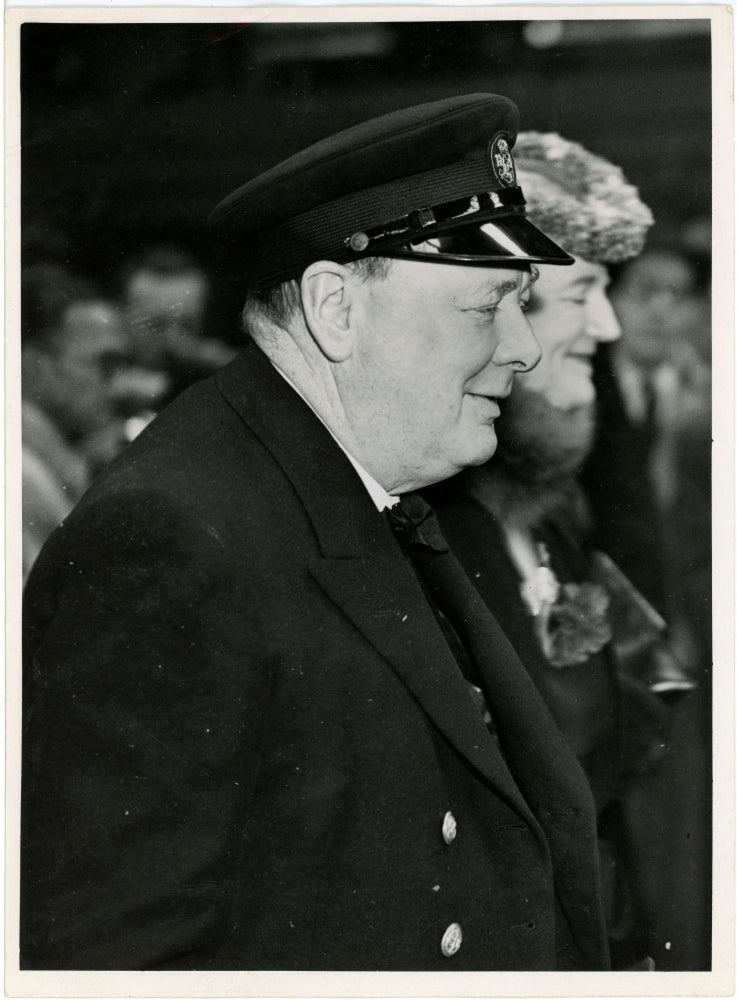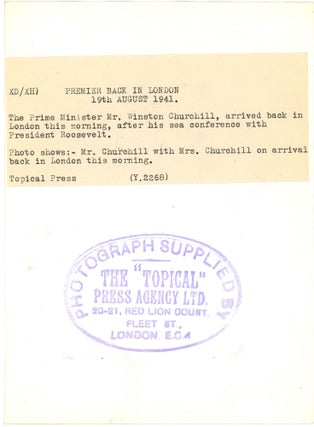An original wartime press photograph of Prime Minister Winston S. Churchill and his wife, Clementine, on 19 August 1941, taken upon Churchill’s return from the Atlantic Charter Conference with President Franklin D. Roosevelt
London: The Topical Press Agency, 19 August 1941. Photograph. This original press photograph captures Prime Minister Winston S. Churchill and his wife, Clementine, on 19 August 1941 upon Churchill’s return from the Atlantic Charter Conference with President Franklin D. Roosevelt. The gelatin silver print on glossy photo paper measures 8 x 6 inches (20.3 x 15.2 cm). Condition is very good. The paper is crisp and clean with sharp corners and some light scratches visible only under raking light. The verso bears the copyright stamp of “The ‘Topical’ Press Agency Ltd.” and a typed caption. The caption is titled and dated “PREMIER BACK IN LONDON 19th August 1941” and reads, “The Prime Minister Mr. Winston Churchill, arrived back in London this morning, after his sea conference with President Roosevelt. Photo shows:- Mr. Churchill with Mrs. Churchill on arrival back in London this morning.”
In August 1941, British Prime Minister Winston S. Churchill braved the Battle of the Atlantic to voyage by warship to Placentia Bay, Newfoundland, where he secretly met with U.S. President Franklin D. Roosevelt. Their agenda included setting constructive goals for the post-war world, even as the struggle against Nazi Germany and Imperial Japan was still very much undecided and the U.S. had yet to formally enter the war. The eight principles to which they agreed became known as the Atlantic Charter. “That it had little legal validity did not detract from its value… Coming from the two great democratic leaders of the day… the Atlantic Charter created a profound impression on the embattled Allies. It came as a message of hope to the occupied countries, and it held out the promise of a world organization based on the enduring verities of international morality.” (United Nations)
In addition to encapsulating the Allies’ postwar aspirations and catalyzing formation of the United Nations, the Atlantic Charter testified to the remarkable personal relationship between FDR and Churchill. “Support for the principles of the Atlantic Charter and a pledge of cooperation to the utmost in giving effect to them, came from a meeting of ten governments in London shortly after Mr. Churchill returned from his ocean rendezvous. This declaration was signed on September 24 by the USSR and the nine governments of occupied Europe: Belgium, Czechoslovakia, Greece, Luxembourg, the Netherlands, Norway, Poland, Yugoslavia and by the representatives of General de Gaulle, of France.” Nonetheless, Atlantic Charter principles were remote from the realities of war in August 1941.
Even after Newfoundland, to Churchill’s frustration, America had still “made no commitments and was no nearer to war than before the ship board meeting.” (Gilbert, VI, p.1176) In his live broadcast from Chequers on August 24, Churchill modestly introduced the Atlantic Charter thus: “…a simple, rough-and-ready war-time statement of the goal towards which the British Commonwealth and the United States mean to make their way…” Not until December 1941, after the Japanese attack on Pearl Harbor, did America formally enter the war and not until October 1945 was the United Nations established, embodying the lofty principles of the Atlantic Charter. Even then, the Cold War was already nascent, ensuring that a geo-political reality based on those noble principles would remain as remote as it was in Placentia Bay in August 1941.
This press photo comes from The Topical Press Agency. During the first half of the twentieth century, photojournalism fundamentally changing the way the public interacted with current events. Newspapers assembled expansive archives, including physical copies of all published photographs and those deemed suitable for potential future use. Today these photographs exist as repositories of historical memory, technological artifacts, and often striking pieces of vernacular art. Item #005029
Price: $160.00


